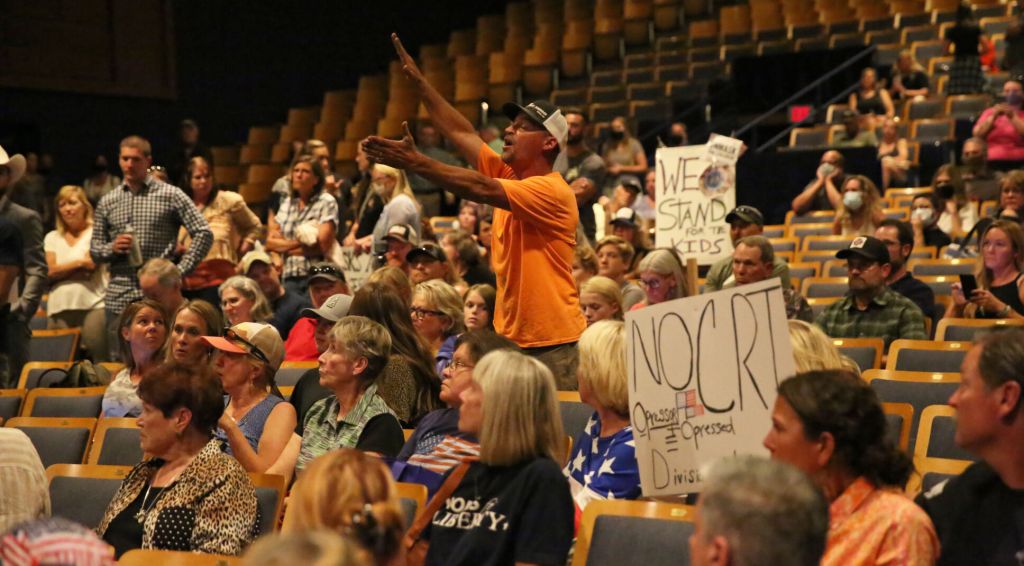Poll: Oregon school boards have low public support
Published 9:59 am Monday, April 11, 2022

- David Calaway shouts Aug. 10, 2021 during a contentious school board meeting at Bend High School.
Oregonians broadly support funding educational programs, yet recent statewide survey respondents generally lacked support for their local school boards.
Only 36% of those polled said they feel their school board represents their values and beliefs. Another 38% said they don’t feel represented by their local school board and 26% said they were unsure.
Oregon Values & Beliefs Center’s latest survey, which polled 1,563 Oregon residents ages 18 and older, found that Democrats are more likely than Republicans to voice support for the school board in their area. Respondents who are higher income — earning $100,000 or more annually — and those who are higher educated are more likely to feel represented by their school boards than those with less income and education.
The 26% of respondents who said they were “unsure” about their local school board indicated a lack of familiarity with the work and decisions of elected education officials, but that isn’t the case everywhere.
Last year saw a public rift between school leadership and residents in Newberg, where a school board voted to ban staff from displaying political or controversial flags, apparel and images, such as Black Lives Matter and LGBTQ pride flags, on school district property. A few months after that vote, the school board fired its superintendent without cause.
Fallout from the controversial board decisions led to an unsuccessful but close recall effort against Newberg School Board members Dave Brown and Brian Shannon in January. The election revealed sharp public divide on whether the school board was representing its community, with 52% of voters opposed to the recall and 48% voting in favor.
A large number of respondents cite political influences in their disapproval of their local school board.
“School boards have become too political,” one Yamhill County Republican noted. “They should focus on education, not social justice and political indoctrination.”
A Deschutes County Republican respondent said: “The school board is focused on social issues, culture and indoctrination. They do not take the steps to improve education only making supporting programs that fit their agenda. This is done to the detriment of learning.”
But another Deschutes County survey taker, a Democrat, said her school board was “not doing enough to support POC & LGBT community. Racism, sexism, & homophobia are rampant in Bend & concerns by parents are ignored. … They talk the talk, but don’t walk the walk.”
In Clackamas County, Cris Waller said her local school board was “taken over by conservatives” in the last election.
“I’ve heard from people I know about what a disheartening time it is to be a school board because of the relentless pressure from right-wing groups,” Waller said when reached by Pamplin Media Group. She said that the same groups that have been taking over school board meetings have been taking over Clackamas County’s board of commissioners.
In Washington County, one woman said voters in her community “managed to keep crazy, fringe characters” off the school board. “However, they are banging at the door to get in with their white-pride, Christian-zealot fervor.”
Kwee Heong Tan, also of Washington County, said his local school board “cares about admin and non-education areas like artificial grass, while textbooks are old, and emphasis on AP subjects are reduced due to lack of teachers.”
While Oregonians are split on whether they are being served and represented by local school leadership, the survey shows broad support (70% or higher) for an array of taxpayer-funded family support services like tutoring, sports, after-school clubs, children’s health care and youth mental health services.
Even those services that garnered the least support, like culturally inclusive learning materials and required cultural awareness and implicit-bias training for school staff, showed 70% of those polled felt they were valuable.
When it comes to supporting childcare and early learning programs, particularly for kids with special needs or disabilities, more than half (56%) of Oregonians say it’s “very important” to offer childcare and learning programs. More than 86% of those polled said it’s somewhat or very important to fund programs for special needs children.
Similarly, 79% said it was somewhat or very important to make childcare more affordable for families through additional government funding.
“Women are more likely than men to express strong support for using taxpayer funds to bolster early learning and childhood programs and services,” the OVBC noted in its summary of survey results. “Lower-income residents are also more supportive.”
Still, residents are mixed on how to pay for those services. In Multnomah County, which enacted new tax measures in 2020, and in Portland, specifically, which now has the highest state and local combined income-tax rate in the nation, higher-income earners are feeling the squeeze.
“I currently pay over $500 per month in property tax. I get a little over $1,000 from SS. I am raising my grandchildren. Do the math,” one woman in Multnomah County, who identifies as a Democrat with a “somewhat liberal” social ideology, told surveyors. “I cringe at the thought of all these well-meaning projects being proposed, knowing full well it will be property taxes that pay for it. Then all the 20-30 year-olds voting it all in and then whining about high rent.”
The Oregon Values and Beliefs Center is committed to the highest level of public opinion research. To help obtain that, the nonprofit is building a large research panel of Oregonians to ensure that all voices are represented in discussions of public policy in a valid and statistically reliable way.
Selected panelists earn points for their participation, which can be redeemed for cash or donated to a charity. To learn more, click here.




